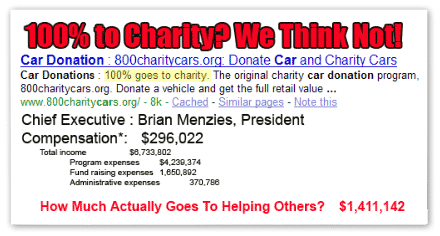Recession stalls car donations
People keeping vehicles 'until the wheels fall off'
By Rick Barrett of the Journal Sentinel
Feb 2009
Update -
Brian Menzies
Gave himself a small raise to only $301,442 a year now!
No wonder they have a waiting list for those really in need until 2011 !
Brian Menzies President, CEO
Before the stock market melted down, before the government starting writing
multibillion-dollar bailout checks, the folks at Rawhide Inc. knew something was
going wrong with the economy.
Donations of cars to the New London charity were sinking. After falling off
sharply in 2005, when tax laws limited the tax deduction a donor could take,
vehicle donations continued slipping again last year.
"We noticed the economy was on a downward trend before everybody else did," said
Tim Costello, executive director of the nonprofit, which runs a ranch for
troubled teens.
Rawhide relies on donations of cars, trucks, boats and RVs for about one-third
of its annual operating budget. In 2008, it received 6,100 donated vehicles -
down about 8% from 2007, and half of what it received in 2004.
"When the tax law changed, it rocked our world. There was a big drop-off in
donors," Costello said.
Some other Wisconsin charities have had similar experiences, with the economy
and the tax-law change putting a squeeze on those that rely on donated cars to
help needy families.
"With the economy the way it is, some people are just hanging on to their old
cars until the wheels fall off," said James Klein, resource development
counselor with Jesus Cares Ministries in Milwaukee.
In 2008, Jesus Cares Ministries had 15 vehicle donations, down from 26 in 2006.
So far this year, only one person has asked about donating a car to the charity,
which uses the proceeds from donated vehicles to help people with developmental
disabilities.
Vehicle donations accounted for about 10% of Jesus Cares Ministries' $375,000
budget in 2008. It also uses some of the vehicles in its own fleet.
"Americans give generously during hard times. But the uncertainty in this
economy is unprecedented during our lifetimes - unless you lived through the
Great Depression," Klein said.
The Government Accountability Office said last year that a majority of charities
it surveyed had vehicle donations drop after the tax law changed in 2005.
Since 2004, vehicle donations have fallen about 80% at the Salvation Army, said
Graham Allan, adult rehabilitation centers commander for the Chicago-Milwaukee
region.
According to the most recent vehicle-donation statistics available from the
Internal Revenue Service, about 297,000 federal income tax returns reported
used-car donations for 2005, down 67% from 901,000 for 2004. The amount claimed
for those donations plunged by 81% to $470 million in 2005 from more than $2.4
billion in 2004.
Under the American Jobs Creation Act, which took effect in 2005, a donor can
claim a deduction for the fair market value of a vehicle only if the charity
plans to use the vehicle itself or give it to a needy individual. If a charity
sells a vehicle - often at an auction - the donor can claim a deduction only for
the actual sales price.
For example, suppose you donate a Toyota Camry that you thought was worth
$2,400, based on used-car publications. If the charity sells it at a vehicle
auction for $800, in most cases all you could deduct would be the $800.
As with many tax laws, there are exceptions. For example, the IRS says you
typically may deduct the vehicle's fair-market value if the charity sells it to
a needy individual for a price significantly below that value.
Some nonprofits have benefited from the provision. Esperanza Unida, for example,
resells hundreds of vehicles a year to local families.
In 2008, vehicle donations to the Milwaukee-based charity were up 25% - to more
than 300 cars - as many people realized they could get a better tax deduction
there.
Esperanza uses vehicles to train auto mechanics in addition to helping needy
families with low-cost transportation.
Proceeds from vehicle sales represent about 25% of the nonprofit's annual
budget.
"They're vital to our organization," Executive Director Robert Miranda said.
Some national charities also have been affected by the falloff in used vehicle
donations.
At the National Kidney Foundation, gross revenue from car donations totaled
$12.8 million in 2008, down 34% from $19.5 million in 2004.
Charity Cars, a Florida-based nonprofit that refurbishes donated cars and
provides them directly to disadvantaged people, handled about $8 million worth
of vehicles in fiscal year 2006-'07.
"This year, we will be lucky to do half that amount," said Brian Menzies ,
Charity Cars chief executive officer. "When people aren't buying new cars, they
aren't donating their old ones."


